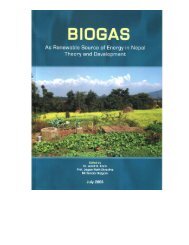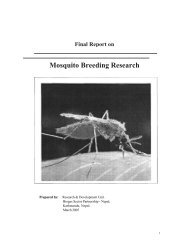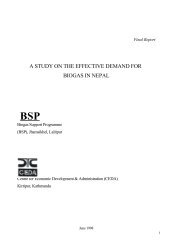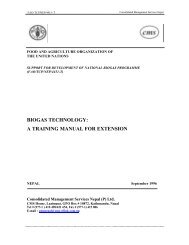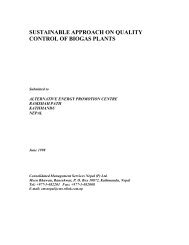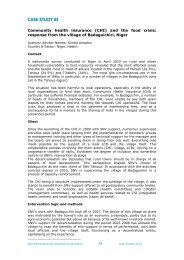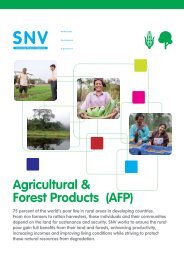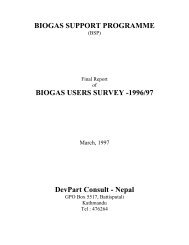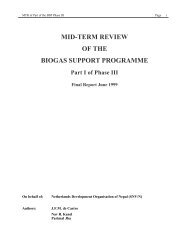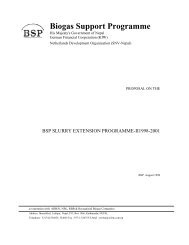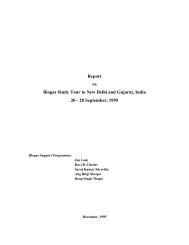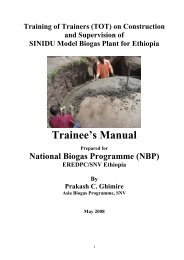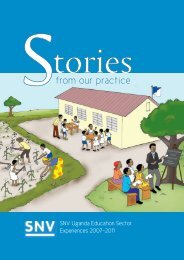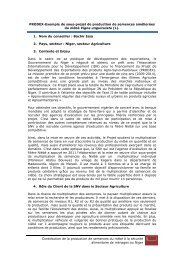SNV Uganda 2009 Annual Report
SNV Uganda 2009 Annual Report
SNV Uganda 2009 Annual Report
You also want an ePaper? Increase the reach of your titles
YUMPU automatically turns print PDFs into web optimized ePapers that Google loves.
ensure that their practices positively affect enrolment, retention and<br />
quality of education services.<br />
“With this knowledge,<br />
my wish is that illiteracy<br />
The <strong>Uganda</strong> Constitution (1995) stipulates education as a right for all stops with me“, SMC<br />
and subscribes to both the Education for All goal and the Millennium member Yumbe<br />
Development Goals. Actually realising these goals, though, is still<br />
uncertain. In many districts access to primary education and the<br />
quality of it are hindered by high pupil and teacher absenteeism,<br />
gender disparity in completing the education, inadequate infrastructure and human resource issues.<br />
Underpinning all these structural challenges are issues of accountability, transparency and efficient use<br />
of resources.<br />
<strong>SNV</strong> <strong>Uganda</strong>’s support to primary education aims to<br />
• increase enrolment and retention, especially of girls, in primary schools<br />
• improve the quality of service provided to promote holistic learning<br />
To achieve these aims, <strong>SNV</strong> initiated forums that brought all major players together to identify issues,<br />
seek solutions, manage them with the aim of improving coordination and collaboration, and ultimately<br />
promote efficiency and transparency.<br />
Throughout the year, a number of districts addressed district-specific issues:<br />
In Mpigi District, parents volunteered to mobilise fellow parents to send children to school and support<br />
them to complete primary 7, while in Kiboga District, functional adult literacy was introduced for parents<br />
so that they would learn to read and write and could then help their children with their homework.<br />
Radio programmes were used to mobilise community support for universal primary education.<br />
Further positive outcomes noted from these meetings<br />
include the favourable environment created for all<br />
parties to harness their roles and responsibilities.<br />
Leaders in districts, sub counties and schools strove to<br />
“<strong>SNV</strong> has shown us the way! Now,<br />
we can take up our responsibility<br />
create innovative strategies to improve service delivery.<br />
to improve the efficiency and<br />
Support to school management committees resulted in effectiveness of primary education<br />
better handling of school affairs. Most have instituted in our district,” District Education<br />
mechanisms for improving school affairs and monitoring<br />
Officer, Kyenjojo District.<br />
pupil learning. In Rakai, 25% of schools now have<br />
school feeding programmes as a result of active school<br />
management committees. In Kyenjojo, teacher and pupil<br />
absenteeism decreased by 50% while in Rwenzori, rates of completing primary school improved from<br />
35.6% in 2007 to 51.5% in 2008.<br />
In Kiboga, the district education officer invites head teachers for peer- to-peer support in charting<br />
improved teaching and management practices for the district. This participatory approach has resulted<br />
in improved management at all education levels in the district. Improved collaboration among head<br />
teachers has improved the sharing of resources and has motivated teachers. By the end of <strong>2009</strong>, Kiboga<br />
registered that 90% of teachers had attended the beginning of the term compared with only 50% at the<br />
beginning of <strong>2009</strong>.<br />
In Bundibugyo, the district education officer met with others to agree on an education road map for the<br />
district, providing a framework for collaboration and investments and stipulating interventions that would<br />
promote education for all.<br />
The accuracy of available data to enable proper planning and decision making continues to be a challenge<br />
5



